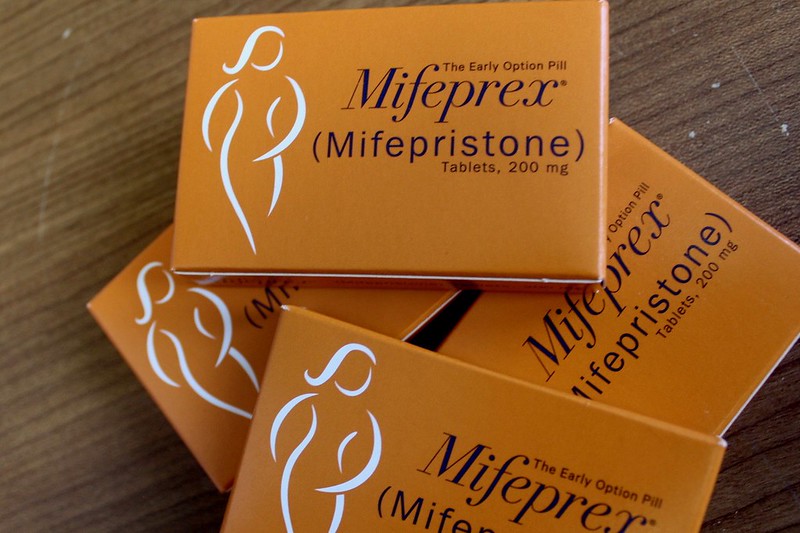Over 70 Congress members are calling for “equitable, science-based” policies governing access to the abortion pill.

In early May, the Biden administration announced the U.S. Food and Drug Administration (FDA) would review longstanding restrictions on the abortion pill mifepristone. On Thursday, U.S. Reps. Carolyn Maloney (D-N.Y.), Diana DeGette (D-Colo.), Barbara Lee (D-Calif.) and Ayanna Pressley (D-Mass.) jointly announced a resolution to support “equitable, science-based” policies governing access to the abortion pill.
“Patients should be able to receive medication abortion in the way that makes most sense for them from the provider of their choosing, whether that is at a health center, their local pharmacy, or delivered to their home,” the resolution argues.
More than 70 House Democrats joined as original cosponsors of the resolution.
“Mifepristone is extremely safe—the FDA’s own data confirms this,” said Maloney, who is chairwoman of the Committee on Oversight and Reform. “It’s time that we trust the science and ensure access to safe, legal abortion, particularly for communities where abortion care has been historically pushed out of reach.”
Approved by the FDA for use during the first 10 weeks of pregnancy, medication abortion uses two types of pills: mifepristone, which interrupts the flow of the hormone progesterone that sustains the pregnancy, and misoprostol, which causes contractions to expel the contents of the uterus. This combination of pills is more than 95 percent effective and is a very safe way to end an early pregnancy.
Despite its safety and because of intense anti-abortion pressure, the FDA restricts the distribution of mifepristone through a drug safety program called the Risk and Evaluation Mitigation System (REMS). Under this program, the FDA prohibits retail pharmacies from stocking and distributing mifepristone and allows the medication to be dispensed only in certain health care facilities through a certified prescriber. This policy has blocked telemedicine abortion.
The FDA REMS requires providers to sign up with the drug distributor, order and stock the medication, give detailed information about the medication to patients, have them sign a consent form, label the medication and then distribute it directly to patients. These onerous requirements limit the number of providers willing to offer medication abortion and significantly increase the cost for patients.

The resolution quotes the American College of Obstetricians and Gynecologists: The REMS restrictions for mifepristone “have no medical basis, provide no patient benefit and unnecessarily restrict access to care.”
“There is no reason for the FDA to impose unnecessary restrictions on the medication abortion drug mifepristone—a safe and effective form of medication abortion care,” said Lee, co-chair of the Pro-Choice Caucus along with DeGette.
Let’s be clear: @US_FDA’s in-person dispensing requirement has pushed medication abortion out of reach for people of color, low income people, & people in rural communities.
— Rep. Barbara Lee (@RepBarbaraLee) August 19, 2021
@RepDianaDeGette, @RepPressley, @RepMaloney & I are calling for an end to this discriminatory policy. https://t.co/T4jjzmrSuM
According to the resolution, “The FDA permits numerous drugs posing greater safety risks than mifepristone to be administered to patients without REMS restrictions.”
After a lawsuit challenging the restriction during COVID, the FDA temporarily lifted the in-person dispensing requirement for mifepristone for the duration of the coronavirus public health emergency. As a result, telemedicine abortion has surged in the U.S. Research in the U.K. and the U.S. shows that telemedicine abortion is as safe and effective as in-person.
“Abortion pills have proven to be both safe and effective, yet needless restrictions are making it harder for women to access the care they need,” said DeGette. “As co-chair of the Pro-Choice Caucus, we are committed to eliminating all unnecessary barriers to abortion care, including the onerous and unnecessary restrictions on the use of medication abortion. We look forward to working with the FDA to ensure any policies regarding the use of mifepristone are based solely on science and evidence, not politics or ideology.”
Lee highlighted the burdens these barriers place on the most vulnerable people seeking medical care.
“For people already experiencing health disparities—including people of color, people with lower incomes, and people in rural communities–the FDA’s restrictions often push access to medication abortion out of reach,” said Lee. “We cannot allow discriminatory stigma to keep people from accessing the health care they deserve. As Pro-Choice Caucus co-chair, I remain committed to eliminating any and all hurdles for people to access safe abortion care.”
The resolution is endorsed by more than 40 medical, reproductive rights, reproductive justice and legal advocacy organizations, including ACOG, Physicians for Reproductive Health and the National Women’s Health Network, which has led a campaign to remove the REMS restrictions.
“For far too long, the FDA’s unnecessary restriction on mifepristone has prevented folks from accessing safe and effective medication abortion care,” said Pressley. “Our resolution affirms Congress’s support for just, safe and science-based medication abortion policies. This is a crucial moment for action, and if we’re serious about affirming health care as the human right that it is, then we must ensure equitable access to care.”
Up next:





